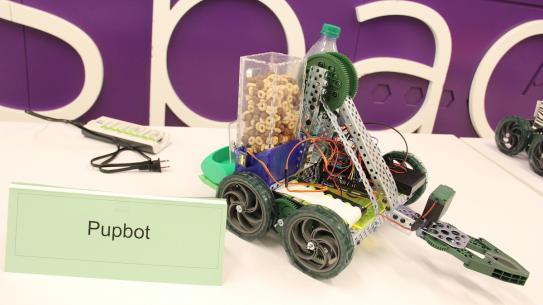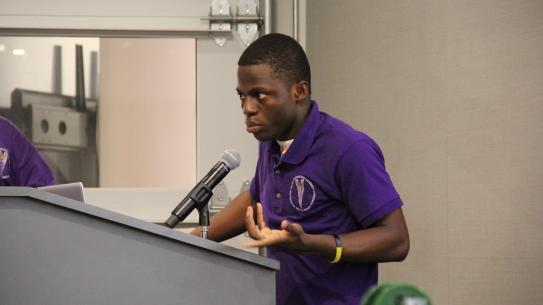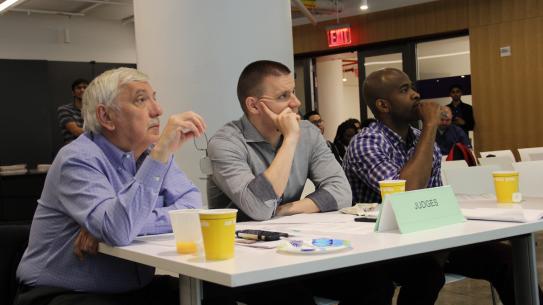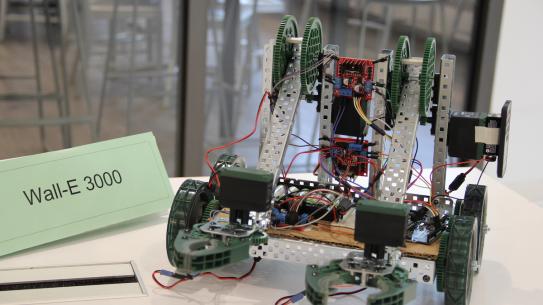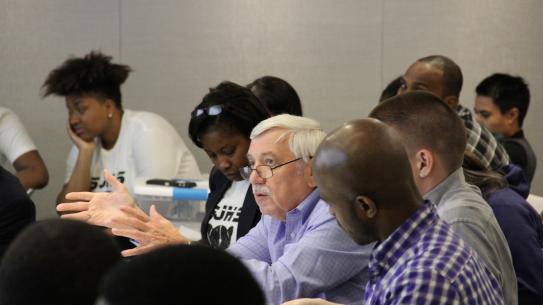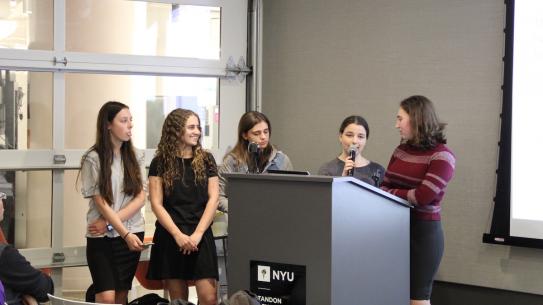Meet New York’s Newest Roboticists
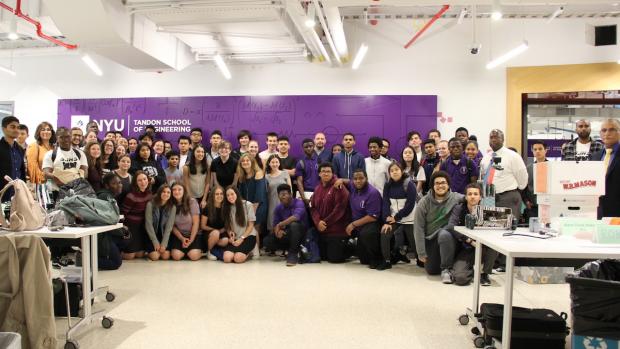
Participants in the inaugural NYU ITEST InnoVention competition, a National Science Foundation-funded project that integrates robotics into high school STEM education
The MakerSpace at NYU Tandon became a shark tank of sorts on Tuesday, May 22, 2018, when high school students dove into entrepreneurship to pitch their robotic inventions to a panel of experts. The event was the finale of the inaugural NYU ITEST InnoVention competition, a National Science Foundation-funded project that aimed to show metropolitan-area high schoolers and their teachers how robots can turn STEM (Science, Technology, Engineering, and Math) into a scintillating team sport with real-world applications.
Ma’ayanot Yeshiva High School for Girls took first place with Pupbot, a pet-sitting robot that can watch, feed, water, and generally entertain cats and dogs. The students and their teacher, Aryeh Tiefenbrunn, comprise one of ten teams of high schoolers from all five boroughs and Long Island who brought robots, presentations, and talking points to the MakerSpace to vie for bragging rights.
As one participant noted in her presentation, cleaning one’s home takes time that may be better spent doing something else. Indeed, robots that do more than vacuum were big winners: Validus Preparatory Academy in the Bronx came in at the number-two spot with the VPA Cleaning Robot, while St. Joseph High School in Brooklyn took third place for Zeno, a robot that can sweep and mop.
The teams were required to use Vex Robotics platforms to build structural elements and mechanisms of their bots along with an array of sensors and Arduino microcontrollers, although the one team from beyond the five boroughs, Plainedge High School in Massapequa, built their robotic home-security device embedded with Raspberry Pi, winning a special award for their efforts.
Other participants hailed from John Bowne High School, Aspirations Diploma Plus High School, Yeshiva of Flatbush, Ralph R. McKee CTE High, South Brooklyn Community High School, John Adams High, and S.T.A.R. Early College.
The NYU ITEST program, funded through a three-year grant from the National Science Foundation (NSF), and directed by Vikram Kapila, Professor of Mechanical and Aerospace Engineering, and Dr. Sheila Borges Rajguru, Assistant Director of the Center for K12 STEM Education at NYU Tandon, kicked off last summer when 16 teachers and 32 students from schools representing all five boroughs — most in underserved neighborhoods with diverse student bodies — participated in a month-long intensive to learn how to incorporate robots into their STEM curricula. The program also draws wide support from collaborating faculty, including, Professor Magued Iskander, Jin Montclare, Oded Nov, and Maurizio Porfiri, all from NYU Tandon, as well as Catherine Milne from NYU Steinhardt.
Kapila emphasized to students and their teachers that our society is being reshaped with rapid advances in technologies such as robotics, artificial intelligence, and augmented reality, among others. He complimented the students on gaining a solid practical experience in exploring robotics technologies and becoming pioneers among their peers.
“I look forward to some of these pioneers shaping these technologies, and their societal adoption in coming years,” he said.
Borges Rajguru explained that the program involves a rigorous set of guidelines developed by NYU instructors and the Center for K12 STEM Education. “It’s a very in-depth rubric that explains the judging criteria,” she said. “Additionally, NYU student entrepreneurs visited the classrooms as mentors, supporting the marketability and entrepreneurship aspect of their prototyping.”
“Young girls and underrepresented students of color are even today told explicitly and implicitly that science is not for them; being able to be part of an institution like NYU and learning robotics, and entrepreneurship from people in the field and people who are starting their own companies — to be able to have access to that kind of human capital — is very empowering for the students and teachers,” she stressed.
ITEST kicked off last summer at NYU Tandon’s #STEMNOW K12 summer education program, now in its sixth year, with teacher/student teams spending two weeks on full-time guided training and another two on robotic-product development.
In the fall the teachers took their experience back to school, where they launched a robotics course for at least 25 students, facilitated through a professional learning community, with mentors, including NYU Tandon undergraduate and graduate students who made regular visits to the schools.
“We give them parameters around which to design robotics providing a solution to a real-world problem,” said Ben Esner, director of the K12 Stem Education Center. “There’s an entrepreneurship component in which they learn topics like pitching, marketing, and calculating unit costs.
Some 48 teachers and 96 students from 24 high schools will have participated in the summer institute by 2020. Those participants are expected, however, to ultimately seed new programs and activities at their own schools that will engage 1,200 others over the course of the funding period. That’s 1,200 new innovators thinking of ways to use robotics to solve real-world problems — and limitless potential.


